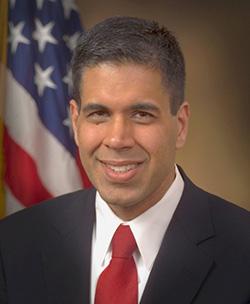Booking After "Booker"
New York, November 25, 2015—Congressional legislators and the U.S. Justice Department are rethinking federal sentencing, a decade after sentencing guidelines were rendered “advisory” under the Supreme Court decision in United States v. Booker.
| In a recent talk at Columbia Law School, U.S. District Judge Amul R. Thapar said that changes in federal sentencing should draw from successful criminal justice reforms at the state and local levels. |
Bipartisan support surrounds a bill in the U.S. Senate--the Sentencing Reform and Corrections Act--which would reduce some mandatory minimum sentences as part of a larger effort to bring down the federal prison population. But U.S. District Judge Amul R. Thapar sounded a note of caution to “think carefully before we act,” in a Nov. 2 talk hosted by the Columbia Law School Federalist Society, part of its annual Madison Lecture Series for Judicial Engagement.
Thapar’s talk, titled “Booking After Booker: The Hopes and Perils of Sentencing Reform,” touched on a range of issues, from the unpredictability of judicial discretion to the problem of prison recidivism, to the power of prosecutors and their pretrial deals. A one-time prosecutor, Thapar worked as the U.S. Attorney for the Eastern District of Kentucky and as an Assistant U.S. Attorney in the Southern District of Ohio and in the District of Columbia, before being named Judge to the U.S. District Court, for the Eastern District of Kentucky in 2008. He was the first Article III judge of South Asian descent.
Thapar said changes in federal sentencing should draw from successful criminal justice reforms at the state and local levels. “We’ve got to take advantage of different states adopting different approaches. Find out why in California we’re having problems, while in Texas we’re reducing incarceration and seeing lower crime.” California’s problems, he said, stem in part from the passage of Proposition 47, which reduced low-level drug and property crimes from felonies to misdemeanors.
“Crime went up,” he explained. “Of course, we can’t just blame Proposition 47 for it. Some of the literature says that, but there may be other explanations as well. There’s definitely an answer, and it’s not incarceration. Before we do anything like Prop. 47 in the federal government, we’ve got to put together a comprehensive plan. We have to study what's worked and what hasn't before we get crazy with giving judges discretion.”
In mandating sentences the federal guidelines were intended “to avoid the judge lottery,” Thapar said, ensuring fairness and consistency in sentencing. In the post-Booker world, he said, statistics show that if you are black, you are more likely to get jail time than if you are white, for the same crime. The time when there was the least racial disparity in sentencing was during the Protect Act, 2003-2004, the pre-Booker period. The Protect Act made the guidelines mandatory, and that reduced racial disparity in sentencing.”
Thapar said he supports “judicial craftsmanship” in devising reduced sentences for first-time and low-level offenders, perhaps enrollment in drug treatment and job training programs instead of incarceration. That said, he thinks current sentencing structure does not do enough to punish—that's right, to punish—repeat offenders..
Currently about 20 percent of the prison population—or 1 in 5—have committed 15 or more priors, Thapar said. And many of those released commit another crime within one year. “When I was a prosecutor I had a murderer who [was a repeat offender who] got out and committed a violent bank robbery. The way to stop recidivism is to keep the recidivists in jail.”
Thapar has seen families of offenders complain when a sentence carries no prison time, because they hope drug treatment is part of the program. He has included treatment and frequent check-ins at court as part of the sentences for about 80 low-level offenders. “Our success rate has been outstanding,” he said.
“If you want to have [alternative] programs, I’m all for it,” Thapar said. “But don’t just say ‘we’re going to reduce prison time’ and throw the offenders back on the streets.”
# # #
